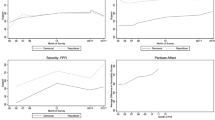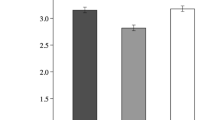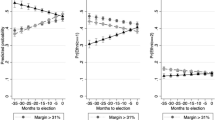Abstract
How does partisan polarization in the United States affect foreign perceptions of its security commitments and global leadership? In a survey experiment fielded to 2000 adults in the United Kingdom, I demonstrate that priming respondents to think about US polarization negatively impacts their evaluations of the US-UK bilateral relationship. These impacts are stronger for the long-term, reputational consequences of polarization than for immediate security concerns. While foreign allies do not expect the United States to renege on existing security commitments, perceptions of extreme polarization make them less willing to engage in future partnerships with the United States and more skeptical of its global leadership. I find that these negative reputational consequences of polarization are driven by perceptions of preference-based, ideological polarization rather than identity-based, affective polarization. The results suggest that American allies anticipate that increasing divergence between the Republican and Democratic Party will create future uncertainty around US foreign policy.



Similar content being viewed by others
Notes
Public opinion polls showed that 92 percent of self-identified Republicans voted for Donald Trump in the 2016 US presidential election (Pew Research Center 2018).
For the purposes of this study, I refer to this form of polarization as preference polarization because it is framed to UK respondents in the survey as increasing divergence in policy preferences rather than increasing ideological coherence. I use the term ‘preference’ to avoid introducing ideological labels in the survey like ‘liberal’ and ‘conservative,’ which have different connotations in British politics relative to American politics.
See Kertzer (2021) for a discussion of this trend and an overview of recent research.
An online appendix provides the full survey questionnaire.
A Cronbach’s alpha of 0.7 or higher is generally considered internally consistent in the social sciences.
‘Speeding’ here is measured before the treatment so that dropping respondents from the analysis does not bias the results.
References
Aronow, Peter M., Jonathan Baron, and Lauren Pinson. 2019. A note on dropping experimental subjects who fail a manipulation check. Political Analysis 27 (4): 572–589.
Asmus, Ronald D. 2003. Rebuilding the Atlantic alliances. Foreign Affairs 82 (5): 20–31.
Atwood, Kylie and Nicole Gaouette. 2020. `How Biden plans to undo Trump’s `America First' foreign policy and return US to world stage.' CNN, October 31. https://www.cnn.com/2020/10/31/politics/biden-foreign-policy-plans/index.html
BBC World Service. 2018. 'Live from Washington: Kavanaugh vote due.' BBC News, September 28. https://www.bbc.co.uk/programmes/w172w60yj84fqqf
Bond, Jon R., and Richard Fleisher. 2000. Polarized politics: congress and the president in a partisan era. Washington: CQ Press.
Boxell Levi, Gentzkow Matthew, Shapiro Jesse M. 2020. Cross-country trends in affective polarization. NBER Working Paper Series.
Bradburn, Norman M., Seymour Sudman, and Brian Wansink. 2004. Asking Questions: The Definitive Guide to Questionnaire Design. San Francisco: Jossey-Bass.
Brands, Hal. 2016. American grand strategy and the liberal order: continuity, change, and options for the future. Rand Corporation.
Brands, Hal. 2017. The unexceptional superpower: American grand strategy in the age of Trump. Survival 59 (6): 7–40.
Brooks, Stephen G., and William C. Wohlforth. 2016. America abroad: The United States’ global role in the 21st century. Oxford: Oxford University Press.
Broz, J. Lawrence. 2002. Political system transparency and monetary commitment regimes. International Organization 56 (4): 861–887.
Busby, Joshua and Jonathan Monten. 2018. Has Liberal Internationalism Been Trumped? In Chaos in the liberal order: the Trump presidency and international politics in the twenty-first century, ed. Robert Jervis, Francis J. Gavin, Joshua Rovner and Diane N. Labrosse. 49–60. New York: Columbia University Press.
Chaudoin Stephen, Milner Helen V, and Tingley Dustin. 2018. Down But Not Out: A Liberal International American Foreign Policy. In Chaos in the liberal order: the Trump presidency and international politics in the twenty-first century, ed. Robert Jervis, Francis J. Gavin, Joshua Rovner and Diane N. Labrosse. 61–97. New York: Columbia University Press.
Chayes, Antonia. 2008. How American treaty behavior threatens national security. International Security 33 (1): 45–81.
Coats Daniel R. 2018. 'Worldwide threat assessment of the US intelligence community.' Office of the Director of National Intelligence.
Cooley, Alexander, and Daniel Nexon. 2020. Exit from hegemony: the unraveling of the American global order. Oxford: Oxford University Press.
Cowhey, Peter F. 1993. Domestic institutions and the credibility of international commitments: Japan and the United States. International Organization 47 (2): 299–326.
Diermeir, Daniel, and Christopher Li. 2019. Partisan affect and elite polarization. American Political Science Review 113 (1): 277–281.
Dinic Milan. 2015. ‘Who do the British regard as allies?’ YouGov Daily, October 14. https://yougov.co.uk/topics/politics/articles-reports/2015/10/14/who-do-british-regard-allies
Dueck, Colin. 2015. The Obama doctrine: American grand strategy today. Oxford: Oxford University Press.
Edwards George C, and Barrett Andrew. 2000. Presidential agenda setting in Congress. In Polarized Politics: Congress and the President in a Partisan Era, ed. Jon R. Bond and Richard Fleisher. Congressional Quarterly Press.
Flynn Michael, and Fordham Bejnamin O. 2019. ‘Everything old is new again: the persistence of Republican opposition to multilateralism in American foreign policy.’ Working Paper.
Friedersdorf, Conor. 2018. ‘Trump and Russia both seek to exacerbate the same political divisions.’ The Atlantic, January 23. https://www.theatlantic.com/politics/archive/2018/01/trump-russia-twitter/551093/
Gaubatz, Kurt Taylor. 1996. Democratic states and commitment in international relations. International Organization 50 (1): 109–139.
Gholz, Eugene, and Daryl Press. 2010. Footprints in the sand. American Interest 5 (4): 59–67.
Gidron, Noam, James Adams, and Will Horne. 2020. American affective polarization in comparative perspective. Cambridge: Cambridge University Press.
Goldsmith, Benjamin E., Yusaku Horiuchi, and Kelly Matush. 2021. Does public diplomacy sway foreign public opinion? Identifying the effect of high-level visits. American Political Science Review 115 (4): 1342–1357.
Hobolt, Sara B., Thomas J. Leeper, and James Tilley. 2021. Divided by the vote: affective polarization in the wake of the Brexit referendum. British Journal of Political Science 51 (4): 1476–1493.
Holsti, Ole R. 2004. Public opinion and foreign policy (revised edition). Ann Arbor: University of Michigan Press.
Hubbard Kaia. 2021. ‘Obama pursuing climate accord in lieu of treaty.’ U.S. News and World Report, January 11. https://www.usnews.com/news/best-countries/articles/2021-01-11/attack-on-capitol-building-shakes-views-of-us-exceptionalism
Ignatieff, Michael, ed. 2005. American exceptionalism and human rights. Princeton University Press, UK
Ikenberry, G. John. 2018. The end of liberal international order? International Affairs 94 (1): 7–23.
Iyengar, Shanto, Gaurav Sood, and Yphtach Lelkes. 2012. Affect, not ideology: a social identity perspective on polarization. Public Opinion Quarterly 76 (3): 405–431.
Iyengar, Shanto, and Sean J. Westwood. 2015. Fear and loathing across party lines: new evidence on group polarization. American Journal of Political Science 59 (3): 690–707.
Iyengar, Shanto, Yphtach Lelkes, Matthew Levendusky, Neil Malhotra, and Sean J. Westwood. 2019. The origins and consequences of affective polarization in the United States. Annual Review of Political Science 22 (7): 129–146.
Kertzer Joshua D. forthcoming. Re-assessing elite-public gaps in political behavior. American Journal of Political Science.
Kertzer, Joshua D. 2021. Public opinion about foreign policy. In Oxford Handbook of Political Psychology, ed. Third Edition. Leonie Huddy, David Sears: Jack Levy and Jennifer Jerit. Oxford: Oxford University Press.
Kertzer Joshua D., Kathleen E. Powers, Brian C. Rathbun, and Iyer Ravi. 2014. Moral support: how moral values shape foreign policy attitudes. Journal of Politics 63(3): 825-830.
Khong, Yuen Foong. 2014. Primacy or world order? The United States and China’s rise. International Security 38 (3): 153–175.
Koremenos, Barbara, Charles Lipson, and Duncan Snidal. 2001. The rational design of international institutions. International Organization 55 (4): 761–799.
Kupchan, Charles A. 2020. Isolationism: a history of America’s efforts to shield itself from the world. Oxford: Oxford University Press.
Kupchan, Charles A., and Peter L. Trubowitz. 2007. Dead center: the demise of liberal internationalism in the United States. International Security 32 (2): 7–44.
Kupchan, Charles A., and Peter L. Trubowitz. 2010. The illusion of liberal internationalism’s revival. International Security 35 (1): 95–109.
Lauderdale Benjamin E., and Alexander Herzog. 2016. Measuring political positions from legislative speech. Political Analysis 24 (3): 374-394.
Layne, Christopher. 2009. America’s Middle East strategy after Iraq: the moment for offshore balancing has arrived. Review of International Studies 35 (1): 5–25.
Leeds, Brett Ashley, Michaela Mattes, and Jeremy S. Vogel. 2009. Interests, institutions, and the reliability of international commitments. American Journal of Political Science 53 (2): 461–476.
Lelkes, Yphtach, Gaurav Sood, and Shanton Iyengar. 2015. The hostile audience: the effect of access to broadband internet on partisan affect. American Journal of Political Science 61 (1): 5–20.
Liu, Louise. 2016. ‘The whole world is glued to the US election.’ Business Insider, November 8. https://www.businessinsider.com/the-whole-world-watching-the-us-election-2016-11.
Mansfield, Edward D., Helen V. Milner, and B. Peter Rosendorff. 2002. Why democracies cooperate more: electoral control and international trade agreements. International Organization 56 (3): 477–513.
Martin, Lisa L. 2000. Democratic commitments: legislatures and international cooperation. New Jersey: Princeton University Press.
Mason, Lilliana. 2015. I disrespectfully agree: the differential effects of partisan sorting on social and issue polarization. American Journal of Political Science 59 (1): 128–145.
Mason, Lilliana. 2018. Uncivil agreement: how politics became our identity. Chicago: University of Chicago Press.
Mattes, Michaela, Brett Ashley Leeds, and Royce Carroll. 2015. Leadership turnover and foreign policy change: societal interests, domestic institutions, and voting in the United Nations. International Studies Quarterly 59 (2): 280–290.
Maxey Sarah. forthcoming. Finding the water’s edge: when negative partisanship influences foreign policy attitudes. International Politics.
McGillivray, Fiona, and Alastair Smith. 2008. Punishing the prince: a theory of interstate relations, political institutions, and leader change. New Jersey: Princeton University Press.
Mearsheimer, John J. 1990. Back to the future: instability in Europe after the Cold War. International Security 15 (1): 5–56.
Musgrave, Paul. 2019. International hegemony meets domestic politics: why liberals can be pessimists. Security Studies 28 (3): 451–478.
Myrick Rachel. 2018. Towards the extremes: the impact of partisan polarization on international cooperation. Presented at the 2018 Peace Science Society Annual Meeting.
Myrick, Rachel. 2021. Do external threats unite or divide? Security crises, rivalries, and polarization in American foreign policy. International Organization 4 (75): 921–958.
Nye, Joseph. 2004. Soft power: the means to success in world politics. New York: PublicAffairs.
Nye Joseph S. 2012. The future of American power: dominance and decline in perspective. In The domestic sources of American foreign policy: insights and evidence, ed. James M. McCormick. Sixth edition ed. Rowman and Littlefield.
Obama, Barack. 2002. ‘Remarks by Barack Obama in Chicago on October 2, 2002.’ Transcript accessed from NPR. https://www.npr.org/templates/story/story.php?storyId=99591469
Peake, Jeffrey S. 2017. The domestic politics of US treaty ratification: bilateral treaties from 1949 to 2012. Foreign Policy Analysis 13 (4): 832–853.
Peña, Charles V. 2006. A smaller military to fight the War on Terror. Orbis 50 (2): 289–306.
Pew Research Center. 2018. ‘An examination of the 2016 electorate, based on validated voters.’ http://www.people-press.org/2018/08/09/an-examination-of-the-2016-electorate-based-on-validated-voters/.
Pialik, Kristen. 2017. ‘US active-duty military presence overseas is at its smallest in decades.’ Pew Research Center, August 22. http://www.pewresearch.org/fact-tank/2017/08/22/u-s-active-duty-military-presence-overseas-is-at-its-smallest-in-decades/.
Poole, Keith T., and Howard Rosenthal. 1997. Congress: a political-economic history of roll call voting. Oxford: Oxford University Press.
Posen, Barry R. 2007. The case for restraint. American Interest 3 (1): 7–17.
Preble, Christopher A. 2009. Power problem: how American military dominance makes us less safe, less prosperous, and less free. New York: Cornell University Press.
Rapp-Hooper Mira. 2020. ‘Saving America’s alliances: the United States still needs the system that put it on top.’ Foreign Affairs, February 10. https://www.foreignaffairs.com/articles/united-states/2020-02-10/saving-americas-alliances.
Rathbun Brian. 2018. ‘Does Trump structure all? A test of agency in world politics.’ In Chaos in the liberal order: The Trump presidency and international politics in the twenty-first century, ed. Robert Jervis, Francis J. Gavin, Joshua Rovner and Diane N. Labrosse. 98–103. New York: Columbia University Press.
Reuters Staff. 2020. ‘Protests worldwide embrace Black Lives Matter movement.’ Reuters, June 6. https://www.reuters.com/article/us-minneapolis-police-protests-global/protests-worldwide-embrace-black-lives-matter-movement-idUSKBN23D0BO.
Reynolds, David. 1985. A ‘Special Relationship’? America, Britain, and the international order since the Second World War. International Affairs 62 (1): 1–20.
Rogowski, Jon C., and Joseph L. Sutherland. 2016. How ideology fuels affective polarization. Political Behavior 38: 485–508.
Schemm, Paul, Erin Cunningham, Siobhán O'Grady, and Adam Taylor. 2021. ‘US allies react in horror to Capitol assault, hold Trump responsible.’ The Washington Post, January 7.
Schultz, Kenneth A. 2018. Perils of polarization for US foreign policy. The Washington Quarterly 40 (4): 7–28.
Schwartz Matthew S. 2020. ‘Is this American-style civilization? World reacts to presidential debate.’ NPR, September 30. https://www.npr.org/2020/09/30/918764741/is-this-american-style-civilization-world-reacts-to-presidential-debate.
Sherman Wendy. 2018. ‘How we got the Iran deal and why we’ll miss it.’ Foreign Affairs, August 9. https://www.foreignaffairs.com/articles/2018-08-13/how-we-got-iran-deal.
Snyder, Jack. 1991. Myths of empire: domestic politics and international ambition. New York: Cornell University Press.
Sokolsky, Richard, and Aaron David Miller. 2019. ‘Trump is achieving his goal of being the un-Obama, except on Middle East wars.’ USA Today, January 20.
Tomz, Michael, and Jessica L.P.. Weeks. 2020. Public opinion and foreign electoral intervention. American Political Science Review 114 (3): 856–873.
Tomz, Michael, Jessica L.P.. Weeks, and Keren Yarhi-Milo. 2020. Public opinion and decisions about military force in democracies. International Organization 74: 119–143.
Wallcott John. 2020. ‘Unquiet on the Western front: why the 74-year alliance between Europe and America is falling apart.’ TIME, June 17. https://time.com/5855200/us-europe-alliance-failing/.
Walt Stephen. 2019. ‘America has a commitment problem.’ Foreign Policy, January 29. https://foreignpolicy.com/2019/01/29/america-has-a-commitment-problem/.
Webster, Steven W., and Alan I. Abramowitz. 2017. The ideological foundations of affective polarization in the US electorate. American Politics Research 45 (4): 621–647.
Westwood, Sean J., Erik Peterson, and Yphtach Lelkes. 2019. Are there still limits on partisan prejudice? Public Opinion Quarterly 83 (3): 584–597.
Wike, Richard, Janell Fetterfolf, and Maria Mordecai. 2020. ‘US image plummets internationally as most say country has handled coronavirus badly.’ Pew Research Center, September 15. https://www.pewresearch.org/global/2020/09/15/us-image-plummets-internationally-as-most-say-country-has-handled-coronavirus-badly/.
Wittkopf, Eugene R. 1990. Faces of internationalism: public opinion and American foreign policy. Durham: Duke University Press.
Yarhi-Milo, Keren. 2018. ‘After credibility: American foreign policy in the Trump Era.’ Foreign Affairs, December 12. https://www.foreignaffairs.com/articles/2017-12-12/after-credibility.
YouGov Staff. 2017. ‘America’s friends and enemies.’ YouGov, February 2. https://today.yougov.com/topics/politics/articles-reports/2017/02/02/americas-friends-and-enemies.
Author information
Authors and Affiliations
Corresponding author
Additional information
Publisher's Note
Springer Nature remains neutral with regard to jurisdictional claims in published maps and institutional affiliations.
This paper benefited from feedback from Gordon Friedrichs, Sarah Maxey, Kenneth Schultz, Jordan Tama, Michael Tomz, and participants in the November 2020 “Domestic Polarization and US Foreign Policy” Workshop hosted by Heidelberg University and American University. A previous version of this paper was presented at the 2019 International Studies Association Conference in Toronto, Canada.
Supplementary Information
Below is the link to the electronic supplementary material.
Rights and permissions
About this article
Cite this article
Myrick, R. The reputational consequences of polarization for American foreign policy: evidence from the US-UK bilateral relationship. Int Polit 59, 1004–1027 (2022). https://doi.org/10.1057/s41311-022-00382-z
Accepted:
Published:
Issue Date:
DOI: https://doi.org/10.1057/s41311-022-00382-z




